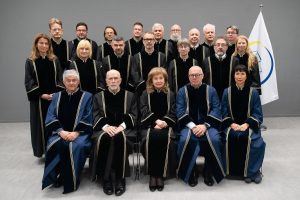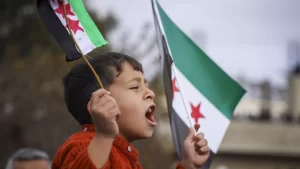
Thirty years after the Srebrenica genocide. The victims’ legal odyssey
Thirty years after the Srebrenica genocide. The victims’ legal odyssey Written for the componente: Armed conflicts Thirty years after
Written for the component: Violences and Human Rights

Introduction: the Terrorism Confinement Center (CECOT) in El Salvador”.
During the emergency regime decreed since March 27, 2022, the government of President Nayib Bukele has broken several records. The first, having the highest incarceration rate in the world by detaining 1.7% of its population (111,844 people). The second, having built the Terrorism Confinement Center (CECOT), the largest prison in the region with a capacity for 40,000 detainees. These types of measures are attributed to the significant reduction in homicide rates, extortion and territorial control of gangs and gangs. This has also contributed to President Bukele’s high popularity rating, surpassing that of his counterparts in the region. Furthermore, his reelection, endorsed by the Constitutional Chamber of the Supreme Court of Justice, has been defended and acclaimed as a necessary measure to give continuity to order and security policies.
In this context, civil society organizations and journalists have denounced arbitrary detentions, disappearances, torture, overcrowding, incommunicado detention, and deaths in detention. These accusations have been denied by high-ranking government officials, who in various scenarios have described them as biased, ideologized, condescending to criminality and insensitive to the victims. Faced with the release of thousands of detainees during the state of emergency, the government has stressed the existence of an inevitable and normal “margin of error” in the work of the security forces. The president has also bluntly described the United Nations as an obsolete system and accused developed countries of imposing double standards.
The approach underlying the Bukele “war on gangs” model is neither novel nor original. In the framework of the so-called war on drugs and the war on terror, the United States of America has promoted policies of mass incarceration within and outside its territory. As a consequence, places of detention have been set up that operate under a logic of dehumanizing warehouses outside of scrutiny, monitoring, and judicial control. In these spaces, minimum conditions of detention and judicial guarantees are abrogated, and incommunicado detention and prolonged and indefinite detention are applied. However, security prevails as a criterion before any kind of balance and as an unquestionable argument to justify the derogation of minimum detention standards. In view of this, the present reflection shows some humanitarian standards and limits applicable even to those who have committed serious crimes.
The CECOT presentation as a model for the region
Confinement under CECOT has been valued as a model for the region. For example, in the framework of the state of emergency in the prison system decreed in 2022, the government of Honduras, led by Xiomara Castro, proposed the construction of two maximum security prisons for gang leaders and as a strategy to reduce overcrowding. Likewise, in 2024, under the declaration of an internal armed conflict, President Daniel Noboa initiated the construction of a maximum security prison in Ecuador that would be built in record time, following the CECOT pattern. Likewise, after visiting CECOT in 2024, some political figures have endorsed its replication in other countries, such as, for example, US Republican Congressman Matthew Gaetz and Argentina’s Security Minister Patricia Bullrich.
Although the Director of the CECOT has stated that this space conforms to international standards, a review of the CECOT would demonstrate otherwise. Three standards and their relationship to CECOT are discussed below: 1. the management of the smallest possible number of persons under restrictive detention regimes, 2. minimum welfare and habitability conditions, and 3. reintegration-oriented prison treatment.
The management of security or restrictive detention regimes is related to the imposition of greater controls on the movement or circulation of some detainees and their reinforced surveillance. These procedures are limited by the prohibition of indefinite or prolonged solitary confinement or confinement in a dark or permanently illuminated cell (Nelson Mandela Rules, rule 43.1 a,b,c). Likewise, these regimes are intended to counteract risks or threats to governance and coexistence in detention centers, to protect the life, integrity and safety of other detainees, their families, prison staff and the community, and to prevent the commission of crimes. With a view to this, institutions such as the United Nations Office on Drugs and Crime UNODC have recommended the implementation of detainee classification processes, aimed at providing individualized treatment focused on overcoming needs and criminogenic factors (UNODC, 2016: p. 141; 2020: pp. 15, 52-54).
CECOT and detention centers such as Izalco would not meet these standards or the recommendation to limit maximum security regimes to as few people as possible. In 2024, CECOT already reached 12,500 gang members, which poses procedural, operational and sustainability challenges associated with the availability of financial and human resources. In addition, the CECOT would not meet the basic standard of separation of detainees according to their status as investigated or sentenced, nor the guarantee of a minimum living space for each detainee (Nelson Mandela Rules, Rules 11 and 12).
The government has indicated that CECOT detainees are denied access to mattresses, bedding, and exposure to sunlight. Although El Salvador does not face an armed conflict, in such a scenario regulated under international humanitarian law, such derogations are prohibited and could even constitute a war crime (Geneva Conventions, common article 3, a, c). The International Committee of the Red Cross (ICRC) indicated that this conduct may arise in cases of legal or illegal detentions, when an action or omission is demanded of a third party as an explicit or implicit condition for the release, safety or well-being of the hostage (ICRC, Commentary on Geneva Convention I: paras. 650, 653). Likewise, this type of measures can be framed under the concept of collective disciplinary punishments, proscribed by the same prison legislation of El Salvador (Article 22.7).
Likewise, the Rome Statute of the International Criminal Court provides that imprisonment or deprivation of liberty in violation of fundamental rules of international law (Article 7.1.e.), torture (Article 7.1.f.) and other inhumane acts (Article 7.1.k) are crimes against humanity.
On the other hand, the media’s recording and publicity of the CECOT has combined images of shadowy spaces, and half-naked bodies, in formation and in a position of subjection. This type of exposure of detainees is also prohibited by the law of armed conflict and human rights law (Geneva Convention III, Article 13) (IACHR, Principle IX, 4, Nelson Mandela Rules, Rule 73). It should be noted, however, that the media coverage of CECOT exceeds and overshadows that of other detention centers in El Salvador, where overcrowding exceeds and triples their occupancy and operating capacity. Likewise, deaths in custody in other centers under maximum security regimes such as Izalco abysmally exceed those that would have taken place in CECOT.
In times of post-conflict and generalized violence, the rights to personal integrity and dignity and the prohibition of cruel, inhuman or degrading treatment or punishment do not admit limitations, suspensions, restrictions or derogations (ACHR, Article 27). In this way, states should not rank, prioritize or relativize the protection of detainees based on the cruelty or atrocity of their crimes. Without these guarantees of restraint on state power, detention becomes a purely vindictive device. The reduction of these material conditions cannot be assimilated to the elimination of privileges in favor of detainees, nor can it be justified as a measure to reduce impunity or satisfy the rights of victims.
The government has denied CECOT detainees the right to participate in educational, work, recreational or sports activities. This type of measure contradicts international standards on the principle of reintegration of the sentence. This purpose is enshrined in the American Convention on Human Rights under the right to personal integrity (ACHR, art. 5.6). Therefore, the exclusion of a sector of the detained population from participating in these activities is a prohibited derogation to a human right that enjoys full immunity (I/A Court H.R., 2022: paras. 51, 52, pp. 24, 25). Likewise, this type of measure is inconsistent with a statement made by the Government of El Salvador before the United Nations Rapporteur on extrajudicial, summary or arbitrary executions. In this document, the government rejects the death penalty and reaffirms that the purpose of the penalty is the development of the detainees, their integration or social readaptation, and the prevention of crime.
In 2018, the penitentiary law was reformed restricting or prohibiting family visits in security or maximum security centers, respectively (articles 5, and 6). At that time, limitations on family visits were part of the extraordinary measures implemented in seven prisons during the Sanchez Ceren administration. During the COVID-19 pandemic, these restrictions were extended to the entire prison population. In 2021, the IACHR recommended that the State reform these norms and guarantee family visits (IACHR, 2021, para. 134). However, under the state of emergency, this prohibition has been imposed not only on CECOT but on the entire penitentiary, prison and police detention system (bartolinas).
Although the government has defended these restrictive measures for security reasons, their widespread imposition constitutes a form of collective punishment and a violation of the principle of reintegration of the sentence and the rights of family members.
Insights on the monitoring of the prison system, criminal policy and criminal public defense.
During the state of emergency, criminal reforms were introduced that increased prison sentences against gang members and adolescents who break the criminal law. Also, the figure of the faceless judge, whose identity is safeguarded for protection purposes, was incorporated. This is incongruent with the militarization and greater territorial control achieved in the state of exception and the claim of crime reduction. However, the limitations to judicial guarantees are aggravated by actions that undermine the independence of the judicial apparatus and the weakness or absence of monitoring of the execution of sentences or pretrial detention.
El Salvador is not a party to the Optional Protocol to the Convention against Torture and Other Cruel, Inhuman or Degrading Treatment or Punishment (OPCAT). This means that El Salvador is not monitored by the Subcommittee on Prevention of Torture (SPT) and has no obligation to establish a national mechanism for the prevention of torture (NPM). Ratification of this instrument would lead to independent and multidisciplinary monitoring in places of deprivation of liberty.
In relation to criminal legislation, in 2021, the Inter-American Court of Human Rights addressed the prohibition of applying alternatives to pretrial detention to certain crimes without necessarily supporting the existence of procedural risks (IACHR Court, Code of Criminal Procedure, Article 331). As a result, the Court ordered El Salvador to modify its regulation of pretrial detention and its automatic application (IACHR, Manuela et al. case, 2021, paras 99-112, 289, pp. 32-36). However, in the current political context, the implementation of this order is not foreseen. On the contrary, in 2024, a reform has been proposed for the extension of provisional detention up to half of the sentence. If approved, the reform would repeal the maximum term of two years for pretrial detention for serious crimes (Article 8). This would mark a step backwards from the principle of the presumption of innocence and legalize the imposition of early sentences.
El Salvador has also failed to comply with the 2015 IACHR Court ruling that ordered measures to strengthen public criminal defense (IACHR Court, Ruano Torres et al. Case, 2015, paras. 234, 235, p. 65, and IACHR Court). The representation of hundreds of detainees linked in the same criminal process represents a challenge for the effective exercise of the right to defense. Under these conditions, the lack of support and resources for the public criminal defense service prevents buffering the effects of the exception regime and effectively protecting the judicial guarantees of detainees during the criminal process and the stage of execution of the sentence or pretrial detention.
Finally, the defense of international standards or humanitarian minimums does not mean denying the prevalence of violence and organized crime in the region, nor minimizing the challenges to address such phenomena or their humanitarian consequences. However, models of mass incarceration and the implementation of maximum security regimes should not be exempt from evaluations of the economic, social and human costs they entail, and their sustainability in the medium and long term. This should also encourage discussions on the role of reintegration of punishment, its operationalization and the validity of excluding certain groups or individuals from this right.
Other related documents:

Thirty years after the Srebrenica genocide. The victims’ legal odyssey Written for the componente: Armed conflicts Thirty years after

The necessity of public and governmental support for transnational justice: the case of the Kosovo Specialist Chambers Written for the

Syria’s Transitional Government and International Law Written for the component: Peace Building and transitions Syria’s Transitional Government and International

An Unlawful Occupation of a Devastated Territory Written for the component:Armed Conflicts: Gaza “The dialogue of the occupying power

From Chaos to Clarity: How Conflict Classification Enhances Peacebuilding Written for the component: Peace Building and Transitions Introduction In today’s

Last Three Years Without serious consequence: Overview of the nature and Challenges of Russia’s War Against Ukraine under The International


To receive more information about our newsletter, please leave us your email address.